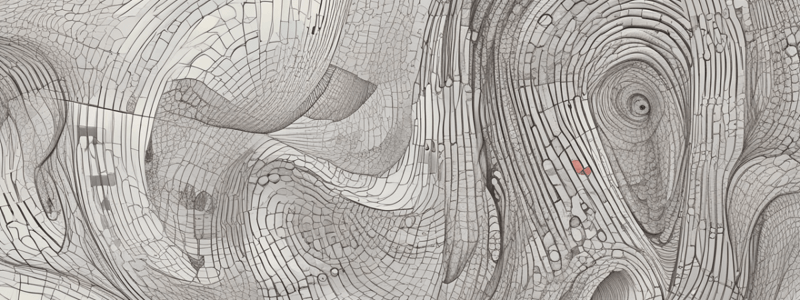Podcast
Questions and Answers
What is the primary condition for the convergence of a sequence?
What is the primary condition for the convergence of a sequence?
- The sequence is bounded above.
- The sequence is monotonic. (correct)
- The sequence is periodic.
- The sequence is bounded below.
What is the definition of a convergent series?
What is the definition of a convergent series?
- A series that has a finite number of terms.
- A series that has a periodic pattern.
- A series that has a infinite sum.
- A series that has a finite sum. (correct)
What is the main difference between a sequence and a series?
What is the main difference between a sequence and a series?
- A sequence is finite while a series is infinite.
- A sequence is a list of terms while a series is the sum of those terms. (correct)
- A sequence is infinite while a series is finite.
- A sequence is the sum of terms while a series is a list of terms.
Which of the following is a test for the convergence of a series?
Which of the following is a test for the convergence of a series?
What is the consequence of a sequence converging to a particular limit?
What is the consequence of a sequence converging to a particular limit?
What can be said about a sequence that converges to a particular limit?
What can be said about a sequence that converges to a particular limit?
What is the purpose of the ratio test for convergence of series?
What is the purpose of the ratio test for convergence of series?
If a series converges, what can be said about its sequence of partial sums?
If a series converges, what can be said about its sequence of partial sums?
What is a necessary condition for the convergence of a series?
What is a necessary condition for the convergence of a series?
What is the relationship between the convergence of a sequence and the convergence of its corresponding series?
What is the relationship between the convergence of a sequence and the convergence of its corresponding series?
If a sequence converges, which of the following must be true about its corresponding series?
If a sequence converges, which of the following must be true about its corresponding series?
If a series converges, what can be said about the sequence of its partial sums?
If a series converges, what can be said about the sequence of its partial sums?
Which of the following is a sufficient condition for the convergence of a series?
Which of the following is a sufficient condition for the convergence of a series?
What can be said about the terms of a convergent series?
What can be said about the terms of a convergent series?
If a series diverges, what can be said about the sequence of its partial sums?
If a series diverges, what can be said about the sequence of its partial sums?
Flashcards are hidden until you start studying
Study Notes
Sequences and Series
- The concept of sequences and series is a fundamental part of mathematical analysis, dealing with the study of ordered lists of objects, known as sequences, and the sum of the terms of a sequence, referred to as a series.
- Sequences and series are used to model various real-world phenomena, such as population growth, financial transactions, and physical systems.
- Understanding convergence of sequences and series is crucial, as it determines whether a sequence or series approaches a finite limit or diverges.
Convergence of Sequence and Series
- Convergence of a sequence or series refers to the tendency of the sequence or series to approach a finite limit as the number of terms increases.
- There are various types of convergence, including pointwise convergence, uniform convergence, and absolute convergence.
- Convergence tests are used to determine whether a sequence or series converges, including the nth term test, the ratio test, the root test, and the integral test.
Sequences and Series
- A sequence is a list of objects, called terms, in a specific order, often denoted by {an} where n is a natural number.
- A series is the sum of the terms of a sequence, often denoted by ∑an.
- Convergence of a sequence or series refers to the existence of a finite limit as the sequence or series approaches infinity.
Convergence of Sequence and Series
- A sequence {an} converges to a limit L if for every positive real number ε, there exists a natural number N such that for all n > N, |an - L| < ε.
- A series ∑an converges to a sum S if the sequence of partial sums {Sn} converges to S.
- Convergence of a sequence or series is often determined by tests such as the nth-term test, ratio test, and root test.
Sequences and Series
- A sequence is an ordered list of numbers, denoted as {an} where n is a natural number
- A series is the sum of the terms of a sequence, denoted as Σan
- Convergence of a sequence means that the sequence approaches a fixed value as it goes to infinity
- Convergence of a series means that the sum of the terms of a sequence approaches a fixed value as the number of terms increases
Studying That Suits You
Use AI to generate personalized quizzes and flashcards to suit your learning preferences.




